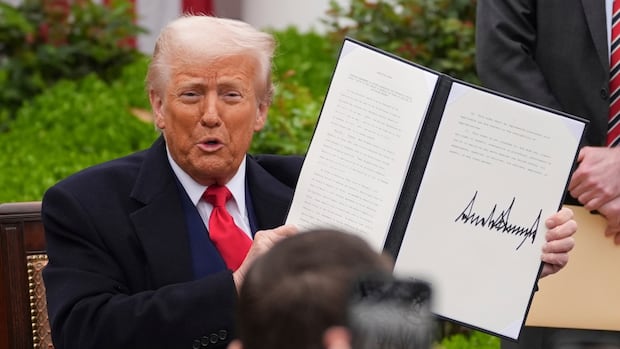Standing in the Rose Garden on Wednesday afternoon to unveil his new reciprocal tariffs, U.S. President Donald Trump again falsely claimed that the U.S. subsidizes Canada by hundreds of billions of dollars every year and misrepresented Canada’s tariffs on U.S. dairy products.
“We subsidize a lot of countries and keep them going and keep them in business,” Trump said. “In the case of Mexico, it’s $300 billion. In the case of Canada, it’s close to $200 billion a year.”
That claim — which Trump has routinely made going as far back as December — is untrue in multiple ways. What the U.S. president was referring to is his country’s trade deficit with Canada, meaning Canada exports more to the United States than the U.S. exports to Canada.
U.S. President Donald Trump has announced sweeping new tariffs, including 10 per cent levies on virtually all imports, and significantly higher reciprocal tariffs against more than 60 countries, but Canada and Mexico were spared for now.
According to the Office of the United States Trade Representative, The U.S. goods trade deficit with Canada was $63.3 billion in 2024, down from $64 billion in 2023. That’s far less than Trump claimed on Wednesday.
There’s another factor to consider: the price of energy. According to Statistics Canada, energy exports such as oil, natural gas and electricity make up about one-third of the goods Canada sent south last year.
Experts have previously told CBC News the size of the U.S. trade deficit with Canada is largely a function of oil prices. If oil prices go down the deficit shrinks, and vice versa if oil prices rise. They also say trade deficits are not a form of subsidy.
Remove energy, experts told CBC News, and it’s actually Canada that has the trade deficit.
Canada’s tariffs on U.S. dairy
During his speech, Trump also claimed Canada imposes a “250 to 300 per cent tariff on many of our dairy products. They do the first can of milk, the first carton of milk at a very low price but after that it gets bad.”
“Take a look at what happens down the road when you look a little bit, it’s not a pretty picture,” Trump added. “And it’s not fair. It’s not fair to our farmers, it’s not fair to our country.”
President Donald Trump says Canada has been ripping off the United States, imposing tariffs of up to 400 per cent on imported American dairy products. Andrew Chang breaks down Trump’s claims, explaining how dairy tariffs work and how likely it is that anyone is actually paying such sky-high charges.
Images supplied by Reuters, Getty Images and The Canadian Press. Additional credits (Credit: 9:17 Skotidakis/Facebook), (Credit: 9:21 Elite Dairy).
His claim is not entirely true. Those high tariffs on U.S. dairy only apply if exports exceed set quotas. Below the quotas, the U.S. dairy products enter tariff-free because of the Canada-United States-Mexico Agreement (CUSMA), according to the U.S. Department of Agriculture.
According to the International Dairy Foods Association, the U.S. has never come close to exceeding its quotas. But the association argues it’s “because Canada has erected various protectionist measures that fly in the face of their trade obligations made under [CUSMA].”
Where is Canada now with tariffs?
Despite Trump’s grievances on Wednesday, the White House said there will be no more across-the-board levies applied to Canada than what has previously been announced.
Trump said however that he is going ahead with a 25 per cent tariff on “all foreign-made” automobiles as of midnight Wednesday, which could have severe implications for the Canadian auto sector.
The White House said that tariff rate will apply to Canadian-made passenger vehicles, but there is a caveat — it will only be levied on the value of all non-U.S. components in that automobile.
On Thursday morning, Prime Minister Mark Carney announced Canada is retaliating against Trump’s latest move with a 25 per cent tariff on vehicles imported from the U.S. that are not CUSMA-compliant. Mexico will not be impacted.
In March, Trump slapped 25 per cent tariffs on Canadian steel, aluminum and goods that are not CUSMA-compliant. He also imposed 10 per cent tariffs on energy products under CUSMA, as well as potash not covered by the trade agreement.
Canada placed retaliatory tariffs on approximately $60 billion worth of U.S. goods in response to Trump’s moves last month.


